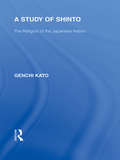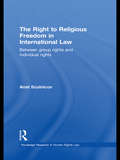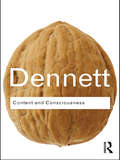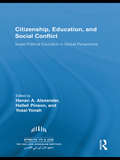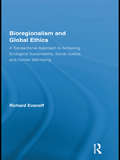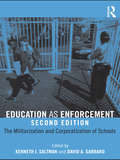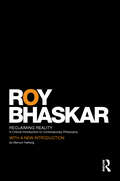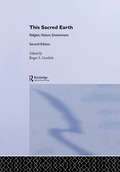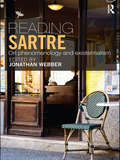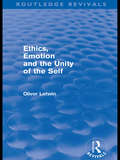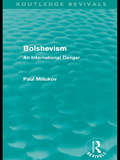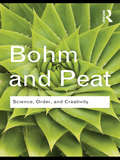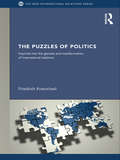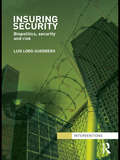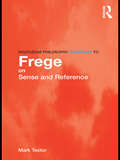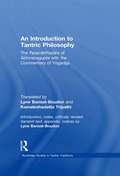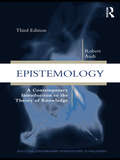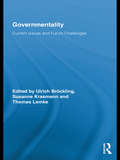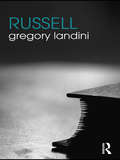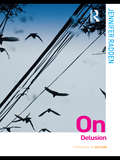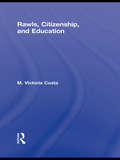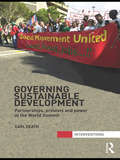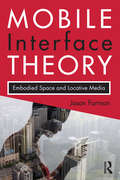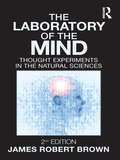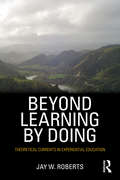- Table View
- List View
A Study of Shinto: The Religion of the Japanese Nation (Routledge Library Editions: Japan)
by Genchi KatuThis volume investigates and present the salient features of Shinto through a long history of development from its remote past up to the present. It is a historical study of Shinto from a scientific point of view, illustrating the higher aspects of the religion, compile on strict lines of religious comparison.
The Right to Religious Freedom in International Law: Between Group Rights and Individual Rights (Routledge Research In Human Rights Law Ser. #2)
by Anat ScolnicovThis book analyses the right to religious freedom in international law, drawing on an array of national and international cases. Taking a rigorous approach to the right to religious freedom, Anat Scolnicov argues that the interpretation and application of religious freedom must be understood as a conflict between individual and group claims of rights, and that although some states, based on their respective histories, religions, and cultures, protect the group over the individual, only an individualistic approach of international law is a coherent way of protecting religious freedom. Analysing legal structures in a variety of both Western and Non-Western jurisdictions, the book sets out a topography of different constitutional structures of religions within states and evaluates their compliance with international human rights law. The book also considers the position of women's religious freedom vis-à-vis community claims of religious freedom, of children’s right to religious freedom and of the rights of dissenters within religious groups.
Content and Consciousness
by Daniel C. DennettContent and Consciousness is an original and ground-breaking attempt to elucidate a problem integral to the history of Western philosophical thought: the relationship of the mind and body. In this formative work, Dennett sought to develop a theory of the human mind and consciousness based on new and challenging advances in the field that came to be known as cognitive science. This important and illuminating work is widely-regarded as the book from which all of Dennett’s future ideas developed. It is his first explosive rebuttal of Cartesian dualism and one of the founding texts of philosophy of mind.
Citizenship, Education and Social Conflict: Israeli Political Education in Global Perspective (Routledge Research in Education)
by Hanan A. AlexanderThis volume provides new perspectives into the challenges of citizenship education in the age of globalization and in the context of multicultural and conflict-ridden societies. It calls on us to rethink the accepted liberal and national discourses that have long dominated the conceptualization and practice of citizenship and citizenship education in light of social conflict, globalization, terrorism, and the spread of an extreme form of capitalism. The contributors of the volume identify the main challenges to the role of citizenship education in the context of globalization, conflicts and the changes to the institution of citizenship they entail and critically examine the ways in which schools and education systems currently address – and may be able to improve – the role of citizenship education in conflict-ridden and multicultural contexts.
Bioregionalism and Global Ethics: A Transactional Approach to Achieving Ecological Sustainability, Social Justice, and Human Well-being
by Richard EvanoffWhile a number of schools of environmental thought — including social ecology, ecofeminism, ecological Marxism, ecoanarchism, and bioregionalism — have attempted to link social issues to a concern for the environment, environmental ethics as an academic discipline has tended to focus more narrowly on ethics related either to changes in personal values or behavior, or to the various ways in which nature might be valued. What is lacking is a framework in which individual, social, and environmental concerns can be looked at not in isolation from each other, but rather in terms of their interrelationships. In this book, Evanoff aims to develop just such a philosophical framework — one in which ethical questions related to interactions between self, society, and nature can be discussed across disciplines and from a variety of different perspectives. The central problem his study investigates is the extent to which a dichotomized view of the relationship between nature and culture, perpetuated in ongoing debates over anthropocentric vs. ecocentric approaches to environmental ethics, might be overcome through the adoption of a transactional perspective, which offers a more dynamic and coevolutionary understanding of how humans interact with their natural environments. Unlike anthropocentric approaches to environmental ethics, which often privilege human concerns over ecological preservation, and some ecocentric approaches, which place more emphasis on preserving natural environments than on meeting human needs, a transactional approach attempts to create more symbiotic and less conflictual modes of interaction between human cultures and natural environments, which allow for the flourishing of both.
Education as Enforcement: The Militarization and Corporatization of Schools
by Kenneth J. SaltmanThe first volume to focus on the intersections of militarization, corporations, and education, Education as Enforcement exposed the many ways schooling has become the means through which the expansion of global corporate power are enforced. Since publication of the first edition, these trends have increased to disturbing levels as a result of the extensive militarization of civil society, the implosion of the neoconservative movement, and the financial meltdown that radically called into question the basic assumptions undergirding neoliberal ideology. An understanding of the enforcement of these corporate economic imperatives remains imperative to a critical discussion of related militarized trends in schools, whether through accountability and standards, school security, or other discipline based reforms. Education as Enforcement elaborates upon the central arguments of the first edition and updates readers on how recent events have reinforced their continued original relevance. In addition to substantive updates to several original chapters, this second edition includes a new foreword by Henry Giroux, a new introduction, and four new chapters that reveal the most contemporary expressions of the militarization and corporatization of education. New topics covered in this collection include zero-tolerance, foreign and second language instruction in the post-9/11 context, the rise of single-sex classrooms, and the intersection of the militarization and corporatization of schools under the Obama administration.
Reclaiming Reality: A Critical Introduction to Contemporary Philosophy (Classical Texts in Critical Realism (Routledge Critical Realism))
by Roy BhaskarOriginally published in 1989, Reclaiming Reality still provides the most accessible introduction to the increasingly influential multi-disciplinary and international body of thought, known as critical realism. It is designed to "underlabour" both for the sciences, especially the human sciences, and for the projects of human emancipation which such sciences may come to inform; and provides an enlightening intervention in current debates about realism and relativism, positivism and poststucturalism, modernism and postmodernism, etc. Elaborating his critical realist perspective on society, nature, science and philosophy itself, Roy Bhaskar shows how this perspective can be used to undermine currently fashionable ideologies of the Right, and at the same time, to clear the ground for a reinvigorated Left. Reclaiming Reality contains powerful critiques of some of the most important schools of thought and thinkers of recent years—from Bachelard and Feyerabend to Rorty and Habermas; and it advances novel and convincing resolutions of many traditional philosophical problems. Now with a new introduction from Mervyn Hartwig, this book continues to provide a straightforward and stimulating introduction to current debates in philosophy and social theory for the interested lay reader and student alike. Reclaiming Reality will be of particular value not only for critical realists but for all those concerned with the revitalization of the socialist emancipatory project and the renaissance of the Marxist theoretical tradition. Roy Bhaskar is the originator of the philosophy of critical realism, and the author of many acclaimed and influential works including A Realist Theory of Science, The Possibility of Naturalism, Scientific Realism and Human Emancipation and Dialectic: The Pulse of Freedom. He is an editor of the recently published Critical Realism: Essential Readings and is currently chair of the Centre for Critical Realism.
This Sacred Earth: Religion, Nature, Environment
by Roger S. GottliebUpdated with nearly forty new selections to reflect the tremendous growth and transformation of scholarly, theological, and activist religious environmentalism, the second edition of This Sacred Earth is an unparalleled resource for the study of religion's complex relationship to the environment.
Reading Sartre: On Phenomenology and Existentialism
by Jonathan WebberJean-Paul Sartre was one of the most influential philosophers of the twentieth century. The fourteen original essays in this volume focus on the phenomenological and existentialist writings of the first major phase of his published career, arguing with scholarly precision for their continuing importance to philosophical debate. Aspects of Sartre’s philosophy under discussion in this volume include: consciousness and self-consciousness imagination and aesthetic experience emotions and other feelings embodiment selfhood and the Other freedom, bad faith, and authenticity literary fiction as philosophical writing Reading Sartre: on Phenomenology and Existentialism is an indispensable resource for understanding the nature and importance of Sartre’s philosophy. It is essential reading for students of phenomenology, existentialism, ethics, or aesthetics, and for anyone interested in the roots of contemporary thought in twentieth century philosophy.
Ethics, Emotion and the Unity of the Self (Routledge Revivals)
by Oliver LetwinThis Routledge Revival reissues Oliver Letwin’s philosophical treatise: Ethics, Emotion and the Unity of the Self, first published in 1987, which concerns the applicability of the artistic classifications of romanticism and classicism to philosophical doctrine. Dr Letwin examines three particular theses associated with philosophical romanticism: that there is within us a high self and a low self; that there is a moral self in inevitable conflict with an amoral self; and that there is a rational self disjoined from and in tension with a passionate self. He argues that these notions of philosophical romanticism are, in fact, radically false, and instead takes the view that man can be a unified being of the sort described by philosophical classicists. But man has to work to achieve this status. The intrinsic unity of the human personality is not a guarantee of a coherent life, but a challenge to be met.
Bolshevism: An International Danger (Routledge Revivals)
by Paul MiliukovFirst published in 1920, Paul Miliukov’s book concerns the international nature of Bolshevism, both in terms of its ideologically internationalist doctrine of World Revolution and in terms of the attempts to spread Bolshevism in the period immediately preceding and following the First World War and the Russian revolution of October 1917. This reissue is a must for anyone interested in the rise of Bolshevism as an international force.
Science, Order and Creativity
by F. David Peat David BohmOne of the foremost scientists and thinkers of our time, David Bohm worked alongside Oppenheimer and Einstein. In Science, Order and Creativity he and physicist F. David Peat propose a return to greater creativity and communication in the sciences. They ask for a renewed emphasis on ideas rather than formulae, on the whole rather than fragments, and on meaning rather than mere mechanics. Tracing the history of science from Aristotle to Einstein, from the Pythagorean theorem to quantum mechanics, the authors offer intriguing new insights into how scientific theories come into being, how to eliminate blocks to creativity and how science can lead to a deeper understanding of society, the human condition and the human mind itself. Science, Order and Creativity looks to the future of science with elegance, hope and enthusiasm.
The Puzzles of Politics: Inquiries into the Genesis and Transformation of International Relations (New International Relations)
by Friedrich KratochwilFriedrich Kratochwil is the author of the classic book: Rules, Norms and Decisions (1989), which introduced constructivism to international relations and has had a profound and significant impact on the discipline. The Puzzle of Politics brings together for the first time a collection of his key essays to explain his approach to international relations and how his thinking has developed over the last 30 years. It addresses topical themes and issues central to his work including sovereignty, law, epistemology, boundaries, global governance and world society. The book includes a framing introduction written for this volume in which Kratochwil provides an intellectual biography providing context as well as an introduction to his work. This important volume will be of very strong interest to students and scholars of international relation, political theory and law. Friedrich Kratochwil is presently Professor of International Relations at the European University Institute in Florence, Italy, and visiting scholar at Kyung Hee University, Seoul, Korea. After receiving his Ph.D. from Princeton he taught at the in the US at Maryland, Columbia and Penn, before returning to the LMU in Munich, Germany. He has been the editor of the European Journal of International Relations and member of the editorial boards of several journals, including the Journal of International Relations of the Asia-Pacific, International Studies Quarterly, International Organization, World Politics, Review of International Studies, and the Journal of International Relations and Development.
Insuring Security: Biopolitics, security and risk (Interventions)
by Luis Lobo-GuerreroInsurance is the world’s largest economic industry, providing a form of security that more than triples global defence expenditure. However, little is know about the form of security insurance provides. This book offers a genealogical interrogation of the relationship between security and risk through its materialisation in insurance. This work seeks to argue that insurance practices ascribe value to life and in so doing produce a form of security central to the understanding of contemporary liberal governance and security. Lobo-Guerrero theorizes insurance as a biopolitical effect that results from the continuous interaction of an ‘entrepreneurial form of power’, and traditional forms of sovereign security. Through rich empirical cases and a unique theorization, the book breaks apart the traditional division between security studies, political economy and political theory. The author explores this theory in relation to specific issues such as the use of life insurance in the molecular age, the use of insurance to securitize against environmental catastrophic risk, specialist products such as kidnap and ransom insurance, as well as the use of insurance to counter maritime piracy in the twenty-first century. Providing an important and original contribution to the study of the biopolitics of security, this work will be of great interest to all scholars of security studies, international relations and international political economy. Insuring War: https://www.routledge.com/products/search?keywords=insuring+war Insuring Life: https://www.routledge.com/Insuring-Life-Value-Security-and-Risk/Lobo-Guerrero/p/book/9780415716079
Routledge Philosophy GuideBook to Frege on Sense and Reference (Routledge Philosophy GuideBooks)
by Mark TextorGottlob Frege (1848-1925) is considered the father of modern logic and one of the founding figures of analytic philosophy. He was first and foremost a mathematician, but his major works also made important contributions to the philosophy of language. Frege’s writings are difficult and deal with technical, abstract concepts. The Routledge Philosophy Guidebook to Frege On Sense and Reference helps the student to get to grips with Frege’s thought, and introduces and assesses: the background of Frege’s philosophical work Frege’s main papers and arguments, focussing on his distinction between sense and reference the continuing importance of Frege’s work to philosophy of logic and language. Ideal for those coming to Frege for the first time, and containing fresh insights for anyone interested in his philosophy, this Guidebook is essential reading for all students of philosophy of language, philosophical logic and the history of analytic philosophy.
An Introduction to Tantric Philosophy: The Paramarthasara of Abhinavagupta with the Commentary of Yogaraja (Routledge Studies in Tantric Traditions)
by Lyne Bansat-Boudon Kamalesha Datta TripathiThe Paramārthasāra, or ‘Essence of Ultimate Reality’, is a work of the Kashmirian polymath Abhinavagupta (tenth–eleventh centuries). It is a brief treatise in which the author outlines the doctrine of which he is a notable exponent, namely nondualistic Śaivism, which he designates in his works as the Trika, or ‘Triad’ of three principles: Śiva, Śakti and the embodied soul (nara). The main interest of the Paramārthasāra is not only that it serves as an introduction to the established doctrine of a tradition, but also advances the notion of jiv̄anmukti, ‘liberation in this life’, as its core theme. Further, it does not confine itself to an exposition of the doctrine as such but at times hints at a second sense lying beneath the evident sense, namely esoteric techniques and practices that are at the heart of the philosophical discourse. Its commentator, Yogarāja (eleventh century), excels in detecting and clarifying those various levels of meaning. An Introduction to Tantric Philosophy presents, along with a critically revised Sanskrit text, the first annotated English translation of both Abhinavagupta’s Paramārthasāra and Yogarāja’s commentary. This book will be of interest to Indologists, as well as to specialists and students of Religion, Tantric studies and Philosophy.
Epistemology: A Contemporary Introduction to the Theory of Knowledge (3rd Edition)
by Robert AudiEpistemology, or “the theory of knowledge,” is concerned with how we know what we know, what justifies us in believing what we believe, and what standards of evidence we should use in seeking truths about the world and human experience. This comprehensive introduction to the field of epistemology explains the concepts and theories central to understanding knowledge. Along with covering the traditional topics of the discipline in detail, Epistemology explores emerging areas of research. The third edition features new sections on such topics as the nature of intuition, the skeptical challenge of rational disagreement, and “the value problem” – the range of questions concerning why knowledge and justified true belief have value beyond that of merely true belief. Updated and expanded, Epistemology remains a superb introduction to one of the most fundamental fields of philosophy. Special features of the third edition of Epistemology include: a comprehensive survey of basic concepts, major theories, and emerging research in the field enhanced treatment of key topics such as contextualism, perception (including perceptual content), scientific hypotheses, self-evidence and the a priori, testimony, understanding, and virtue epistemology expanded discussion of the relation between epistemology and related fields, especially philosophy of mind, philosophy of science, and ethics increased clarity and ease of understanding for an undergraduate audience an updated list of key literature and annotated bibliography.
Governmentality: Current Issues and Future Challenges (Routledge Studies in Social and Political Thought)
by Ulrich BröcklingExamining questions of statehood, biopolitics, sovereignty, neoliberal reason and the economy, Governmentality explores the advantages and limitations of adopting Michel Foucault's concept of governmentality as an analytical framework. Contributors highlight the differences as well as possible convergences with alternative theoretical frameworks. By assembling authors with a wide range of different disciplinary backgrounds, from philosophy, literature, political science, sociology to medical anthropology, the book offers a fresh perspective on studies of governmentality.
Russell: Mathematics, Logic, Philosophy (The Routledge Philosophers #6)
by Gregory LandiniBertrand Russell (1872–1970) was renowned as one of the founding figures of "analytic" philosophy, and for his lasting contributions to the study of logic, philosophy of language, philosophy of mathematics and epistemology. He was also famous for his popular works, where his humanism, ethics and antipathy towards religion came through in books such as The Problems of Philosophy, Why I am Not A Christian, and The Conquest of Happiness. Beginning with an overview of Russell’s life and work, Gregory Landini carefully explains Russell’s philosophy, to show why he ranks as one of the giants of British and Twentieth century philosophy. He discusses Russell’s major early works in philosophy of mathematics, including The Principles of Mathematics, wherein Russell illuminated and developed the ideas of Gottlob Frege; and the monumental three volume work written with Alfred North Whitehead, Principia Mathematica, where the authors attempted to show that all mathematical theory is part of logic, understood as a science of structure. Landini discusses the second edition of Principia Mathematica, to show Russell’s intellectual relationship with Wittgenstein and Ramsey. He discusses Russell’s epistemology and neutral monism before concluding with a discussion on Russell’s ethics, and the relationship between science and religion. Featuring a chronology and a glossary of terms, as well as suggestions for further reading at the end of each chapter, Russell is essential reading for anyone studying philosophy, and is an ideal guidebook for those coming to Russell for the first time.
On Delusion (Thinking in Action)
by Jennifer RaddenDelusions play a fundamental role in the history of psychology, philosophy and culture, dividing not only the mad from the sane but reason from unreason. Yet the very nature and extent of delusions are poorly understood. What are delusions? How do they differ from everyday errors or mistaken beliefs? Are they scientific categories? In this superb, panoramic investigation of delusion Jennifer Radden explores these questions and more, unravelling a fascinating story that ranges from Descartes’s demon to famous first-hand accounts of delusion, such as Daniel Schreber’s Memoirs of My Nervous Illness. Radden places delusion in both a clinical and cultural context and explores a fascinating range of themes: delusions as both individually and collectively held, including the phenomenon of folies á deux; spiritual and religious delusions, in particular what distinguishes normal religious belief from delusions with religious themes; how we assess those suffering from delusion from a moral standpoint; and how we are to interpret violent actions when they are the result of delusional thinking. As well as more common delusions, such as those of grandeur, she also discusses some of the most interesting and perplexing forms of clinical delusion, such as Cotard and Capgras.
Rawls, Citizenship, and Education
by M. Victoria CostaThis book develops and applies a unified interpretation of John Rawls’ theory of justice as fairness in order to clarify the account of citizenship that Rawls relies upon, and the kind of educational policies that the state can legitimately pursue to promote social justice. Costa examines the role of the family as the "first school of justice" and its basic contribution to the moral and political development of children. It also argues that schools are necessary to supplement the education that families provide, teaching the political virtues that support just social institutions. The book also examines the questions of whether civic education should aim at cultivating patriotic feelings, and how it should respond to the deep cultural pluralism of contemporary democratic societies.
Governing Sustainable Development: Partnerships, Protests and Power at the World Summit (Interventions)
by Carl DeathMultilateral UN summits from Stockholm to Copenhagen have set the pace and direction for the global governance of sustainable development. The 2002 Johannesburg World Summit on Sustainable Development (WSSD) was a key moment in the evolution of sustainable development as a discourse and summitry as a technology of government. It firmly established multi-stakeholder partnerships, carbon-trading and communication strategies as primary techniques for dealing with environmental crises. It was also a significant event in terms of South African domestic politics, witnessing some of the largest protests since the end of Apartheid. Carl Death draws on Foucauldian governmentality literature to argue that the Johannesburg Summit was a key site for the refashioning of sustainable development as advanced liberal government; for the emergence of an exemplary logic of rule; and for the mutually interdependent relationship between ‘mega-events’ (summits, world cups, Olympic games) and ‘mega-protests’ understood as Foucauldian counter-conducts. Analysing detailed and original research on the WSSD, Death argues that summits work to make politically sustainable a global order which is manifestly unsustainable. Paradoxically however, they also provide opportunities for the status quo to be protested and resisted. This work will be of great interest to scholars of development studies, global governance and environmental politics.
Mobile Interface Theory: Embodied Space and Locative Media
by Jason FarmanMobile media – from mobile phones to smartphones to netbooks – are transforming our daily lives. We communicate, we locate, we network, we play, and much more using our mobile devices. In Mobile Interface Theory, Jason Farman demonstrates how the worldwide adoption of mobile technologies is causing a reexamination of the core ideas about what it means to live our everyday lives. He argues that mobile media’s pervasive computing model, which allows users to connect and interact with the internet while moving across a wide variety of locations, has produced a new sense of self among users – a new embodied identity that stems from virtual space and material space regularly enhancing, cooperating or disrupting each other. Exploring a range of mobile media practices – including mobile maps and GPS technologies, location-aware social networks, urban and alternate reality games that use mobile devices, performance art, and storytelling projects – Farman illustrates how mobile technologies are changing the ways we produce lived, embodied spaces.
The Laboratory of the Mind: Thought Experiments in the Natural Sciences (Philosophical Issues In Science Ser.)
by James Robert BrownNewton's bucket, Einstein's elevator, Schrödinger's cat – these are some of the best-known examples of thought experiments in the natural sciences. But what function do these experiments perform? Are they really experiments at all? Can they help us gain a greater understanding of the natural world? How is it possible that we can learn new things just by thinking? In this revised and updated new edition of his classic text The Laboratory of the Mind, James Robert Brown continues to defend apriorism in the physical world. This edition features two new chapters, one on “counter thought experiments” and another on the development of inertial motion. With plenty of illustrations and updated coverage of the debate between Platonic rationalism and classic empiricism, this is a lively and engaging contribution to the field of philosophy of science.
Beyond Learning by Doing: Theoretical Currents in Experiential Education
by Jay W. RobertsWhat is experiential education? What are its theoretical roots? Where does this approach come from? Offering a fresh and distinctive take, this book is about going beyond "learning by doing" through an exploration of its underlying theoretical currents. As an increasingly popular pedagogical approach, experiential education encompasses a variety of curriculum projects from outdoor and environmental education to service learning and place-based education. While each of these sub-fields has its own history and particular approach, they draw from the same progressive intellectual taproot. Each, in its own way, evokes the power of "learning by doing" and "direct experience" in the educational process. By unpacking the assumed homogeneity in these terms to reveal the underlying diversity of perspectives inherent in their usage, this book allows readers to see how the approaches connect to larger conversations and histories in education and social theory, placing experiential education in social and historical context.
